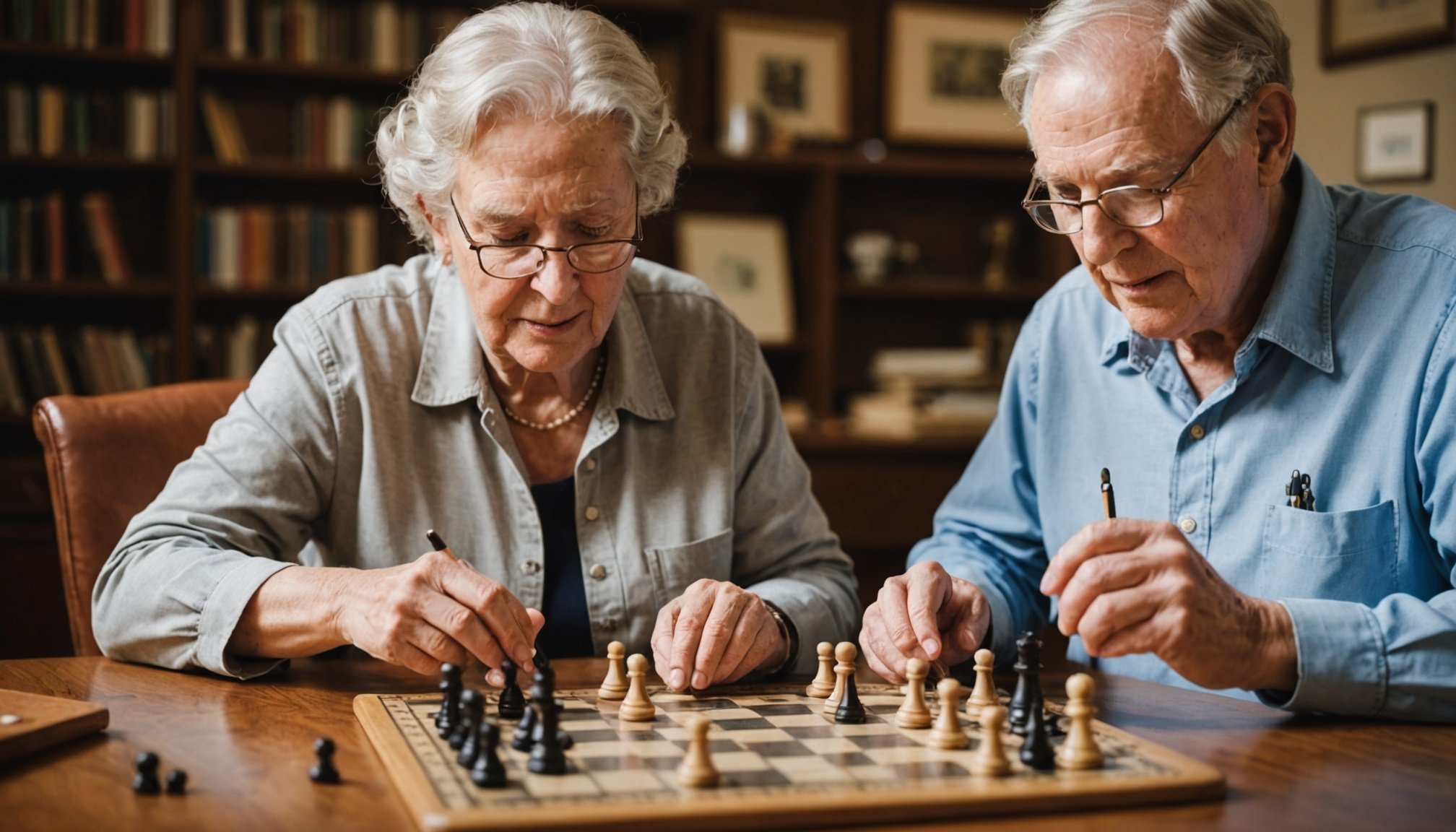Introduction to Brain-Boosting Activities
Engaging in Brain-Boosting Activities is crucial for promoting Cognitive Enhancement and maintaining Senior Health. As we age, cognitive decline becomes a prevalent issue, impacting memory, problem-solving abilities, and overall mental acuity. Mental stimulation is vital in slowing this process and enhancing quality of life.
For seniors, participating in regular mental exercises can mitigate cognitive decline. This does not only maintain, but can also improve brain function. It is essential for seniors to recognise patterns, remember details, and solve problems as part of their daily routine.
Also to see : Essential Hydration Tips for Seniors: Smart Strategies for Staying Hydrated During Outdoor Adventures
Incorporating activities such as games and puzzles into daily life can significantly contribute to overall well-being. Crossword puzzles, for example, challenge the brain to recall vocabulary and establish connections between words, improving cognitive resilience. Likewise, strategic games like chess demand critical thinking and foresight, further enhancing mental agility.
Brain-Boosting Activities provide an enjoyable and accessible way to support mental health in a fun and interactive manner. Not only do they offer a method for cognitive enhancement, but they also encourage social interaction, which is equally crucial for emotional health. Engaging the mind with challenging yet entertaining brain games helps ensure seniors remain mentally active and socially connected.
Additional reading : Unlocking the Benefits of Group Therapy for Seniors Living with Dementia
Recommended Brain-Boosting Games for Seniors
Exploring engaging activities can enrich seniors’ lives, providing valuable cognitive stimulation. Let’s dive into some of the best games for seniors that enhance mental agility and foster social connections.
Board Games
Board games have long been heralded as superb cognitive games. Classics like Chess and Scrabble challenge memory and strategic thought, sharpening the mind. Moreover, these games offer immense social benefits, drawing players into engaging conversations and friendly competition. When choosing age-appropriate games, consider factors such as simplicity, rules clarity, and physical accessibility. Games with large, easily graspable pieces cater to those with dexterity issues, ensuring enjoyment without frustration.
Card Games
For promoting strategic thinking in a simple, accessible format, card games are difficult to surpass. Games like Bridge and Rummy encourage players to concentrate, remember card sequences, and devise strategies. Beyond cognitive benefits, card games serve as wonderful platforms for social interaction, providing opportunities for laughter and storytelling. Many traditional card games have intriguing variations, such as Canasta and Euchre, which can keep the gameplay fresh and exciting.
Video Games
Video games, particularly those designed for brain training, have surged in popularity among seniors. Titles like Brain Age and Lumosity are designed to enhance memory and problem-solving skills. Digital gaming offers cognitive health benefits, including improved coordination and faster reaction times. To ensure safe gaming, it’s crucial to consider screen time limitations and choose games with user-friendly interfaces to avoid frustration and maintain enthusiasm.
Engaging Puzzles for Mental Sharpness
Diving into mental puzzles can significantly enhance your critical thinking and cognitive abilities. Exploring different puzzle types offers a variety of mental challenges that keep the brain engaged and sharp.
Jigsaw Puzzles
Assembling jigsaw puzzles is more than just a fun pastime. They offer considerable cognitive benefits by enhancing spatial awareness and improving problem-solving skills. Jigsaw puzzles vary in difficulty, making them suitable for everyone, from beginners to seasoned puzzle enthusiasts. Recommendations range from simple 300-piece sets to complex 3000-piece landscapes. For group activities, consider setting up a puzzle station where each participant contributes a piece, encouraging both teamwork and critical thinking.
Crossword Puzzles
Crosswords are renowned for boosting vocabulary and improving language skills. Not only do they require a broad range of knowledge, but they also demand creativity to solve clues. Popular sources for these puzzles include daily newspapers and specialized magazines, as well as numerous online platforms offering endless variations. If you find certain clues challenging, start with easier puzzles, and gradually increase the difficulty to build confidence and proficiency.
Sudoku
Sudoku provides a logical framework to develop cognitive prowess. By varying difficulty levels, such as easy, medium, and hard, or even expert, anyone can engage with this mental puzzle to improve concentration and logical reasoning. Techniques like scanning rows and columns for possibilities and using the process of elimination can sharpen problem-solving abilities markedly.
Strategies to Incorporate Games and Puzzles into Daily Life
Incorporating games and puzzles into your daily routine can significantly boost your mental sharpness. Engaging in daily mental activities not only strengthens cognitive abilities but also offers a refreshing break from monotonous tasks. Let’s explore how you can seamlessly integrate these activities into your lifestyle.
Setting a Schedule
Establishing a regular brain game routine provides numerous benefits, such as improved memory and problem-solving skills. To successfully incorporate these activities into your daily schedules, consider setting aside a specific time each day dedicated to mental exercises. This routine incorporation can range from a short morning session to an evening family game night. Collaborating with family members for group activities can enhance engagement and make the experience enjoyable for everyone.
Social Integration
Social connections play a vital role in maintaining mental sharpness. Organize group games or puzzle nights with friends or community members to combine fun and social interaction. Sharing games with others fosters a sense of community while offering varied perspectives on problem-solving strategies.
Keeping It Fun and Engaging
Maintaining motivation is crucial for consistency in puzzles. Choose a variety of activities and adapt them to keep things exciting. Creative ways to reward participation, such as small treats or recognition of progress, can further encourage engagement.
Benefits of Brain-Boosting Games and Puzzles
Engaging in brain-boosting games and puzzles offers a plethora of cognitive benefits. These activities are known to enhance memory and improve brain function. Regular practice can stimulate different areas of the brain, fostering connections that promote overall mental health. For instance, solving puzzles or playing memory games exercises your hippocampus and prefrontal cortex, significant areas involved in memory and higher-level thinking.
One of the key advantages is the ability to reduce the risk of cognitive decline. As we age, maintaining sharp memory and cognitive function becomes crucial. Games that challenge logic, math skills, and problem-solving abilities can help sustain cognitive health into older adulthood. This is not just speculation; various studies corroborate these claims, showing a direct correlation between mental exercises and sustained brain health.
Moreover, engaging in these activities can support emotional well-being. The sense of achievement upon solving a puzzle or mastering a new game can boost mood and reduce stress. On top of improving cognitive abilities, these activities provide a fun and engaging way to support your mental health. Whether young or old, anyone can derive brain function improvement from these enjoyable exercises.
Resources and Where to Find Games and Puzzles
Finding the right resources for games and puzzles can be both exciting and overwhelming. Whether you prefer visiting local stores or using digital platforms, there’s a wealth of options available.
Online and Physical Retailers
When it comes to purchasing games online, Amazon and eBay are two of the most trusted platforms. For those who enjoy a more traditional shopping experience, local bookstores and specialty game shops often have wide selections. Community centres are also valuable resources, frequently offering free printable puzzles to the public.
Apps and Digital Platforms
Mobile apps such as Lumosity and Elevate provide an engaging way to play brain games from anywhere. Digital puzzles offer convenience and an expansive library of options compared to traditional formats. When using gaming platforms, ensure your privacy and security by reviewing app permissions and user reviews.
Community Programs
Local community centers often provide brain game programs, fostering social interaction while enhancing cognitive skills. Senior centers frequently host activities focused on mental engagement. Look for programs that connect seniors with volunteers to promote shared experiences. These programs not only enhance cognitive function but also build community relationships.











